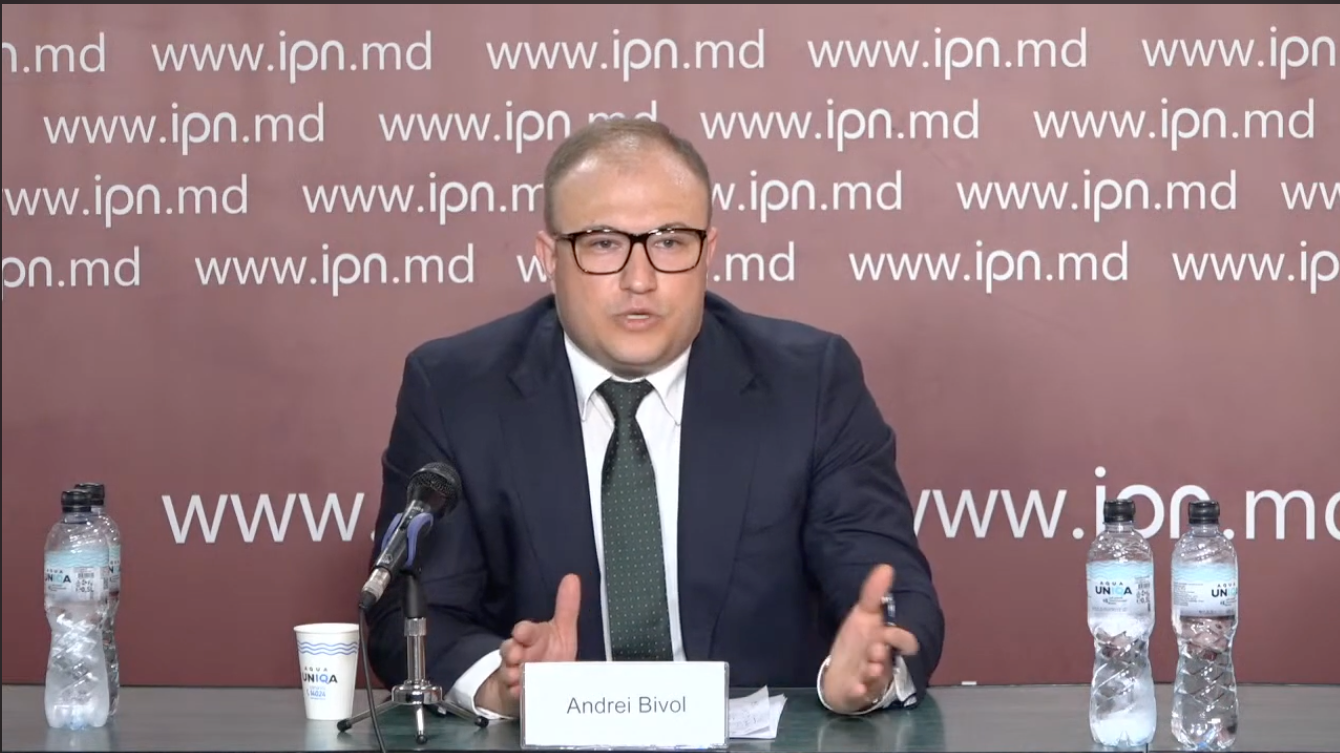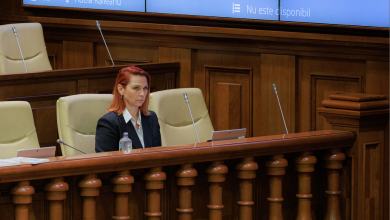Andrei Bivol on Suspending the Licenses of the 6 TV Channels: “The CES Order Is an Exceptional Step in an Emergency Situation, and It Should Be Treated as Such”

The decision of the Commission for Emergency Situations (CES) taken two weeks ago, according to which the broadcasting licenses of the six TV channels were suspended during the state of emergency, has caused different reactions. Some welcome it while the others demand to provide more arguments, and those it concerns disapprove of it. Andrei Bivol, a lawyer and a member of the Council of the Press, discusses the legal aspects of the CES order, alternative solutions, and eventual risks.
Media Azi: Mr. Bivol, a few days after the CES ordered to suspend the licenses of the six TV channels, several media NGOs published a statement claiming that the Commission failed to provide explicit, clear, and detailed arguments to confirm that the decision was justified. To what extent do you agree with the findings of the signatory organizations?
Andrei Bivol: These statements (they were numerous) are a normal reaction in a democratic society, especially because they are made by the organizations protecting human rights. They are mostly balanced and I can say that I could agree with them to a certain extent. The CES decision refers to specific factual and legal foundations which determined the limitation of freedom of expression and implicitly the suspension of the broadcasting licenses of the six TV channels. However, I consider that the provision in question includes explicit and clear arguments, even if they may not be sufficiently detailed for everyone.
I suppose some preliminary clarifications are required. Freedom of expression is a fundamental right, but it is not an absolute one, like the right to life or the right not to be subjected to torture. Under the conditions provided by the legislation, freedom of expression can be limited. These limitations result from Art. 10 para. (2) of the European Convention on Human Rights. Freedom of expression includes duties and responsibilities and may be subject to conditions, restrictions, and sanctions stipulated by the legislation. In a democratic society, such limitations are necessary steps for national security, territorial integrity or public safety, law enforcement and prevention of crimes, protecting reputation and morality, etc. Art. 32 para. (3) of the Constitution of the Republic of Moldova implies a similar approach, expressly stipulating the prevailing values related to freedom of expression. The Constitution prohibits contesting and defaming the state and the people, incitement to aggressive war, national, racial, or religious hatred, incitement to discrimination, territorial separatism, or public violence, as well as other manifestations threatening the constitutional regime. Any limitation is supposed to be balanced between freedom of expression and protecting other values.
What kind of act is the CES order on suspending the licenses from the legal point of view? What are the legal criteria this act should comply with, especially those related to motivation?
The decision has been publicly discussed, polarizing the journalists, the political class, and civil society. A part of society regards the CES order as necessary and absolutely justified, even somewhat delayed, whereas the others see the CES decision as an abusive and inadmissible interference in the freedom of expression.
The CES order is an individual administrative act issued within the framework of the state of emergency regime. The decisions to restrict specific rights or freedoms can only be taken if they are required for the sake of national security, territorial integrity, public order, etc. Art. 31 of the Administrative Code provides for an obligation to motivate individual administrative acts. However, the law does not stipulate any other aspects regarding the amount of detail of such motivation or the standards of a sufficient motivation of an administrative act.
The CES statement provides the following motivation: “[…] in order to protect the national information space and to prevent the risk of disinformation by spreading fake information or attempts to manipulate public opinion, based on the list of individuals and legal persons subject to international sanctions provided in Appendix No 1 to the Provision of the Commission for Emergency Situations No 45/2022, and the information available as a result of their control of some media service providers, as well as multiple statements from the monitoring reports of the Broadcasting Council regarding the breaches of the Code of Audiovisual Media Services of the Republic of Moldova, implicitly application of sanctions for the lack of correct information while covering the national events, and also the war in Ukraine […].” Some critics may find this motivation insufficiently detailed, but it cannot be said that motivation is completely absent. Certainly, if the reasons listed by the CES were false, and if there was no information provided as the basis of the order, it would be a situation of obvious abuse.
If the statements issued by the CES are contested, the court’s control will be limited to verifying the following circumstances: the existence of an exceptional situation as of the day when the provision was issued; the CES’s competence to issue the order; the existence of the public interest justifying the issuance of the provision; the public authority’s actual impossibility to issue the order under the usual conditions; the proportionality of the steps taken.
Therefore, the quality of the CES’s arguments for the order is not one of the circumstances which could be directly verified by the court. However, the court could verify the justification of the existence of the public interest and the proportionality between it and such a step as suspending the broadcasting licenses. When examining an appeal against the CES’s order, the court may demand from the CES to provide the full administrative dossier, i.e. all the information which served as a basis for issuing the provision (including eventual secret information analyzed by the CES). It could provide a complete set of facts which could finally exclude any speculations about such issues as public interest and proportionality.
Freedom of expression presumes duties and responsibilities and may be subject to provisions, restrictions, and sanctions stipulated by the legislation.
From the point of view of the European Court of Human Rights, the reasons for such limitations of freedom of expression should be relevant and sufficient. All the reasons should also be analyzed in terms of legality, proportionality, and the necessity to restrict the relevant right in a democratic society. Considering such a precedent as NIT v. the Republic of Moldova, if the reasons provided by the CES are true, there is very little risk that the CES’s order represents a breach of Art. 10 of the European Convention on Human Rights.
Could the authorities find any other solutions to counter “the lack of correct information while covering the national events, and also the war in Ukraine,” as the CES order stipulates?
A short and simple answer is “yes.” The CES decision was made by way of derogation from the provisions of the Code of Audiovisual Media Services. The CES replaced the Broadcasting Council (BC) which had a legal prerogative to sanction TV channels for breaching the law. It was exactly what actually happened. According to the recent statements by Liliana Vitu, the BC President, in 2022, all the six suspended channels were sanctioned by the BC; some of them even were sanctioned 22 times. The BC can suspend a TV channel’s broadcasting license, and this suspension is one of the harshest sanctions provided by the legislation. The Code of Audiovisual Media Services provides for a multi-level sanctioning mechanism. This mechanism was most probably developed in order to prevent abusive and disproportionate decisions against the media. To apply suspension against a TV channel, a series of milder sanctions must be gradually applied against it initially. The BC could have eventually suspended the licenses in question, but this process would have lasted long, and each suspension would have taken place at different moments.
The six TV channels are allegedly controlled by a group of persons who are a consolidated and imminent threat to national security (or are seen as such by the authorities). Under such circumstances, the solution which was required was a consolidated and immediate one. Emergencies should be treated immediately.
In your opinion, what are the chances that these channels regain the right to return to the TV screens after the state of emergency is over?
I believe there is a chance that these TV channels resume their activity. The CES order expressly provides that suspension is stipulated only for the period of the state of emergency. Therefore, when the state of emergency expires, the broadcasting licenses will be reactivated. This is where another question arises: how long will the state of emergency last and will these TV channels still be active and able to actually resume their work at that moment?
One of the arguments mentioned in the CES order refers to the fact that individuals or legal persons subject to the international sanctions exercise control over the TV channels in question. The transition of Primul in Moldova and Accent TV under the control of Ilan Sor has been publicly discussed. Media Azi has requested information in this regard, but we have been told it represents a state secret. From the legal point of view, is the data regarding the beneficial owner of some TV channels regarded as information of public interest or as a state secret?
Persons subject to international sanctions yet controlling TV channels are a subject of a wider discussion about the possibility of applying international sanctions to the state’s own citizens. In my opinion, applying international sanctions against the state’s own citizens pushes the limits of the Constitution rather seriously and will undoubtedly be a subject of discussion both in the courts and in the Constitutional Court.
In general, the lack of transparency associated with the brief motivation of the CES order affects society’s trust in the state institutions. Yet we should not forget that this order seeks to defend such a value as state security.
Let us return to suspending the broadcasting licenses: this reason is not stipulated by the law. Therefore, it is an exceptional step taken only in the context of the state of emergency.
As to the change of the beneficial owners, the Code is clear about this issue: the BC is supposed to be preliminarily notified of any modifications of this sort. The BC President claims that such breaches have already been detected at some of the suspended TV channels, and the other ones are being currently investigated.
Normally, the identity of the beneficial owners of TV channels is public information. In this case, we could only assume that the real beneficiaries control these TV channels via the intermediaries registered with the BC as beneficial owners. The information about the real beneficiaries (not registered with the BC) may constitute a state secret if it was obtained by the ISS by special investigative means.
What are short-term and long-term risks of such a decision?
From the point of view of the CES and security experts, the CES order was intended to eliminate the risks to national security instead of generating new ones.
In general, the lack of transparency associated with the brief motivation of the CES order affects society’s trust in the state institutions. Yet we should not forget that this order seeks to defend such a value as state security.
In the long run, I believe that the risks of limiting free speech are largely overrated. The CES order is an exceptional step in an emergency situation, and it should be treated as such. This provision is temporary, it is limited only to the term of the state of emergency, and does not represent any precedents.




